
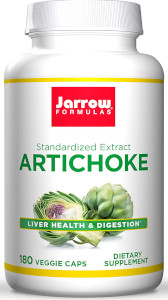
Artichoke Extract
Contains: See supplement facts below
Size: 500mg 180 veggie capsules
Manufacturer: Jarrow Formulas
Suggested Retail Price: US$ 38.95
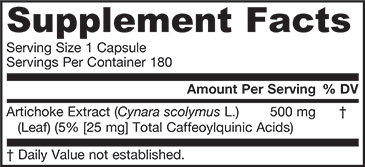
Price: US$ 36.00
Standardized Extract
Supports Liver and Cholesterol Metabolism
Digestive Aid
Helpful for Diabetes
Helpful for Hormone Balancing
Artichoke 500 Extract is standardized to contain 5% total caffeoylquinic acids. Clinical research has documented the following beneficial properties of artichoke extract:
Liver Function - Protects glutathione levels. Stimulates liver activity by promoting circulation within the liver.
Digestion - Stimulates synthesis of bile, a product of the liver that supports detoxification and the absorption of fat-soluble nutrients.
Directions:
Take 1-3 capsules per day with food, or as directed by your qualified health care consultant.
Free Of
Wheat, gluten, soybeans, dairy, egg, fish/shellfish, peanuts/tree nuts.
Artichoke Health benefits:
1. High antioxidant content
Even after boiling, the ORAC value of artichokes is twice that of fresh blueberries, at 9,416 versus 4,669 for the latter. That’s not an outlier, as they actually trounce many of the most hyped superfoods.
The main antioxidants in artichokes are chlorogenic acid, cynarin, luteolin 7-O-rutinoside, and luteolin 7-O-glucoside. Two of the contributing compounds – apigenin-7-rutinoside and narirutin – are completely unique and not found in any other plant.
2. Antibacterial and antifungal
Scientists in Beijing tested extracts of artichoke against several types of bacteria and fungus in the lab:
It didn’t take much, either. The minimum inhibitory concentrations (MIC) of these compounds were between 50 and 200 microg/mL. That’s 50 to 200 parts per million.
To say artichokes are natural antibiotics would be a stretch, because these were isolated compounds. Yet they suggest they have antimicrobial potential.
3. Contains FOS
Fructooligosaccharides (FOS) are a hard word to say, yet their potential benefits for weight loss and blood sugar are easy to make sense of. FOS molecules taste sweet like sugar, yet humans can’t digest them.

So you’re tasting the sweetness, yet you’re not getting the calories of the FOS, nor the dental decay.
FOS was the reason why several years ago, Dr. Oz created a buzz on the advantages of using yacon syrup as an alternative sweetener.
Why artichokes taste sweet is because of their fructooligosaccharides. While you may not want these bulb vegetables for dessert, the FOS content might help with weight loss.
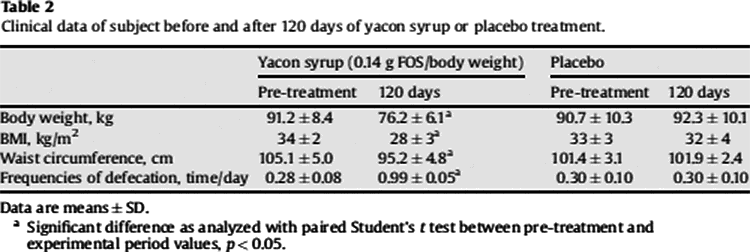
This study wasn’t with artichokes, yet the participants who took yacon syrup lost an average of 33 lbs, while the placebo group actually gained weight!
4. Supports growth of probiotics
Prebiotics are food for probiotics. They are a type of fiber that you can’t digest with stomach acid, but those beneficial microorganisms in your small intestine can. Whether you’re popping artichoke capsules or eating the boiled hearts, you will be consuming a fair amount of a prebiotic known as inulin.
There is a big difference between globe artichoke and Jerusalem artichoke. The latter is a species that is not even related (Helianthus tuberosus). In a misleading manner, the only thing it has in common is that its edible root tastes similar to regular artichokes.
Along with chicory root, you will see Jerusalem artichoke frequently listed as source of inulin on many digestive supplements and protein bars. Those are the two most well-known sources of inulin but tests have shown that globe artichokes have a spectrum of inulin which is “identical to that of chicory inulin” and lab testing has reported:<
“The health-promoting prebiotic effects of artichoke inulin were demonstrated in an extensive microbiological study showing a long lasting bifidogenic effect…”
That was when it was mixed with probiotics in the lab, to see how they ate the inulin.
In a double-blind and placebo-controlled study out of the UK, the long-chain inulin extracted from globe artichokes was found to have “a pronounced prebiotic effect on the human fecal microbiota composition and was well tolerated by all volunteers.”
5. Stimulates production of liver bile
The digestion of fatty foods and the absorption of certain vitamins require your liver to secrete bile, which is a greenish-brown alkaline fluid that helps with their digestion.
Artichokes contain a high concentration of a compound known as cynarin.
As far back as the 1970’s, cynarin has been researched for its ability to stimulate the liver to produce more bile.
6. Fights glycation (from high blood sugar)
Glycation happens when reducing sugars (like glucose) come in contact with proteins, fats, or nucleic acids in the body.
Helpful for Estrogen dominance and hormone balancing.
The glycative stress this creates is linked to accelerated signs of aging and numerous diseases such as cancer and complications from type 1 and type 2 diabetes.
If you look at the official list of carcinogens designated by the World Health Organization, you will see that many of them are advanced glycation end products (AGEs).
These are compounds created by glycation that mutate your DNA. It’s probably the most dangerous – yet least discussed – reason why eating refined sugars are bad for you, even if you are skinny and without disease.
In lab tests measuring the formation of AGES, extracts of artichoke stems and the outer bract (the tough, inedible leaves) were found to have an anti-glycation effect.
The aqueous extract worked best at inhibiting AGEs created from sugars (glucose and fructose) while the ethanolic extract worked best at the AGEs coming from methylglyoxal.
Since these extracts were made from parts of the plant that are not normally edible, this benefit is an advantage that artichoke supplements may offer more effectively.
7. May help with IBS symptoms
With an estimated one-fifth of the population being affected by irritable bowel syndrome (IBS), this disease is a major problem whose cause is not even fully understood.
Whether it’s due to the cynarin and its effects on bile production, the prebiotic content, or something else is unclear, however there has been anecdotal evidence of using artichokes for IBS over the years. This is why the University of Reading in the United Kingdom decided to put it to the test in a human clinical trial:
208 adults with IBS participated
Each participant took a daily dosage of 320 or 640 mg of full-spectrum artichoke leaf extract. This aqueous extract was in a capsule form.
The supplements were used for 2 months.
Compared to the 15 parameters measured at start, there was a significant improvement in symptoms. The best results were for those with IBA-A, which is the type marked by alternating constipation and diarrhea. Overall there was a 20% improvement in quality of life scoring, due to the fewer side effects of IBS.
Here are the results before and after using the artichoke supplement for IBS:
Bowel pattern before and after 2 months of using artichoke leaf extract
Category Day 0 (before) Day 60 (last day)
Normal 18% 39%
Alternating IBS (IBS-A) 52% 32%
IBS with diarrhea (IBS-D) 9% 8%
IBS with constipation (IBS-C) 19% 19%
Missing Data/Dropouts 2% 2%
8. May reduce gastric muscle spasms
Dichloromethane and cynaropicrin are compounds from the plant that have been found to reduce gastric spasms in animal research.
Brazilian scientists tested both male and female guinea pigs. They created a situation where the ileum (a part of the small intestines) suffered from contractions due to the use of acetylcholine.
As you see from the belofe chart for the cynaropicrin compound, the amount of spasms went down in a dose-dependent manner when treated with this extract from artichokes:
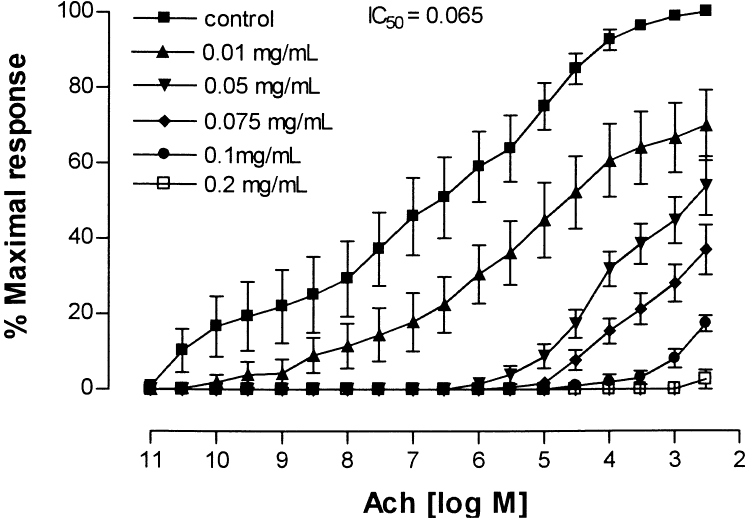
The top line is the control (untreated guinea pigs) which had the worst number of spasms as expected.
As the dosage of artichoke extract went up, the number contractions went down.
Among the tested compounds extracted from this plant, they said the cynaropicrin was the most powerful:
“…having similar potency to that of papaverine, a well-known antispasmodic agent.”
Papaverine is a well-known vasodilator drug used for cardiac-related blood vessel and muscle spasms, as well as those in the digestive tract.
Crohn’s disease is an autoimmune diseases that causes inflammation of the digestive tract. Although different from IBS, spasms can also be a side effect of it too.
It’s unknown if this antispasmodic action is happening in humans but if it is, that may explain why IBS sufferers claim to experience relieve, as well as many who simply have tummy pain and abdominal cramps sometimes after normal eating.
9. Liver protectant
Boosting of bile production isn’t the only thing studied about this organ. There is also research to suggest artichoke leaf extract may protect the liver through multiple methods.
Schistosomiasis is a parasitic infection that kills over 300,000 people annually. In a study with mice infected with schistosomiasis, the groups that received the leaf extract had healthier liver function and less liver fibrosis. It appeared to reduce the side effects of liver damage that are caused by the parasite.
Diabetic rats had healthier liver function and it was believed to be due to the anti-hyperglycemic properties and antioxidant activities of the artichoke leaves.
Some animal research even infers artichokes might regenerate liver cells to a degree.
In a double-blind and randomized clinical trial out of Italy, participants were given a supplement that contained artichoke as well as red rice yeast, banaba leaf (Pride of India plant) and CoQ10. Liver transaminases and C-reactive protein levels improved, both of which are signs of a healthier liver. Though being a formula, you can’t read too far into this.
10. May lower LDL cholesterol
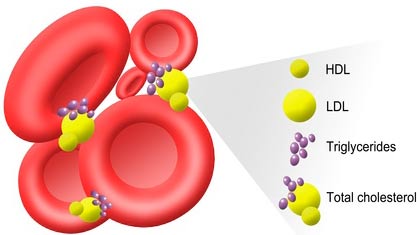
This has been reported in several studies and it’s not unexpected, considering the fact that our liver bile helps remove cholesterol from the body.
Additionally, there might be other ways that artichoke extract lowers cholesterol.
We internally produce some cholesterol. In cultured liver rat cells, it was found that a compound in the plant called luteolin “efficiently blocked the insulin effect on cholesterol biosynthesis.” In other words, it reduced the internal formation of cholesterol.
There have been several human clinical trials out of France which have reported a lowering of LDL cholesterol after using artichoke supplements, however their relevancy is limited since other herbs were included in the tested formula.
There are two clinical trials that have reported lower LDL cholesterol following supplementation with just artichoke alone.
A trial out of Germany with 143 people who had high cholesterol reported a decrease of 22.9% in LDL, compared to 6.3% with placebo. The dosage used was 1,800 mg daily of artichoke dry extract. It was taken for 6 weeks.
A trial out of the UK involved 131 people who experienced an average drop in total cholesterol of 4.2% compared to an increase in the placebo group of 1.9%. The artichoke supplement dose was 1,280 mg daily of standardized leaf extract, taken for 12 weeks.
11. May increase HDL cholesterol
The lowering of bad cholesterol (LDL) would be less impressive if the same was happening with good cholesterol (HDL). Research suggests it’s not.
A university in Italy conducted an 8-week double-blind and placebo controlled clinical trial with 46 overweight middle-aged adults. For the group using a 250 mg twice daily dosage of artichoke leaf extract, there was a favorable increase in HDL, while at the same time total cholesterol and LDL were lowered.
12. Diabetes
This plant is a popular – albeit an unproven supplement – among diabetics in Brazil.
There is insufficient human clinical data to know whether or not it helps humans, though several pieces of research suggest it might.
Cardiovascular side effects are a major problem with diabetes. In a rat model of the disease, the water-based leaf extract of artichokes was studied. Using a dosage of 0.2 grams per kilogram of bodyweight, the Belgium scientists reported that oxidative stress decreased significantly, which may offer preventive effects against the disease, for symptoms such as diabetic retinopathy. They believe the chlorogenic acid and cynarin content was at least partly responsible.
Another later study reported similar findings.
In 2017, another using 40 male rats with diabetes found that the ethanol extract of artichoke leaves had “anti-hyperglycemic properties” meaning it had blood sugar lowering effects.
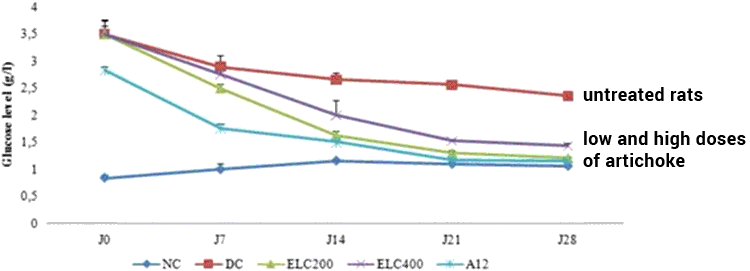
This chart shows the blood glucose levels for the untreated rats (top red line) and two dosages of artichoke leaf extract used for their diabetes; 200 mg and 400 mg/kg of body weight daily.
Tied with those artichoke treatments is the line for treatment with acarbose, which is the anti-diabetic medication sold under the brand Precose.
Just a hair below those treated groups is the blue “NC” line for normal rats without diabetes.
13. Hormone Balancing/Estrogen Dominance
Artichoke extract boosts the production of bile, which in turn, supports liver function to eliminate excess estrogens.
Artichoke extract has been shown to inhibit proliferation and induce apoptosis (programmed cell death) in triple negative (ER-/PR-/HER2-) and HER2/neu overexpressing (HER2+) breast cancer cells in the laboratory. Apigenin and luteolin have been shown to induce apoptosis across a variety of breast cancer cell lines. For example, luteolin has been shown to reduce ER+/PR+ cell viability in a dose- and time-dependent manner and to suppress triple negative breast cancer cell proliferation and metastasis. Luteolin has also been shown to inhibit angiogenesis (new blood vessel formation) and aromatase activity (in which androgens are converted into estrogens) in the laboratory.
See this article: AromataseActivity | Food for Breast Cancer by: Sarah Charles
A process by which androgens are converted to estrogens in the body (transforming androstenedione to estrone and...
Artichoke extract has also been shown to enhance the effectiveness of both Adriamycin and Taxol chemotherapy in hormone receptor positive (ER+/PR+) and triple negative (ER-/PR-/HER2-) breast cancer cells. Artichoke compound apigenin has been shown to inhibit the growth of patient-derived triple negative organoids and sensitize triple negative cells to Adriamycin treatment.
An Italian population study found that the risk of breast cancer was reduced for increasing intake of apigenin, among other flavones. However, no population studies have specifically evaluated the impact of consuming artichokes on the risk of breast cancer.
14. Cancer research
Most people only know of mesothelioma from those lawyer ads for asbestos exposure. It’s definitely not a disease you want to know first-hand. This form of lung cancer is aggressive. Research out of Italy claims:
“…the leaf extract of Cynara scolymus exerts broad antitumoral effects both in vitro and in vivo on mesothelioma cell lines.”
It’s important to point out that this research did not involve humans, only cultured cells and xenograft animal models (human-derived cancer cells growing on mice with altered immune systems).
Using a triple negative and highly aggressive breast cancer cell line, low dosages of artichoke extract were said to…
“…exert anticancer activity through induction of premature senescence.”
In plain English, senescence is the ability for the loss of a cell to divide and grow. Healthy cells were not found to be damaged when using the same dosage.
In research using cultured human leukemia cells, the leaf extract was reported to inhibit their activity.
See this article: Artichoke Leaf Extract Inhibits AKR1B1 and Reduces NF-κB Activity in Human Leukemic Cells
Supports Liver and Cholesterol Metabolism
Digestive Aid
Helpful for Diabetes
Helpful for Hormone Balancing
Artichoke 500 Extract is standardized to contain 5% total caffeoylquinic acids. Clinical research has documented the following beneficial properties of artichoke extract:
Liver Function - Protects glutathione levels. Stimulates liver activity by promoting circulation within the liver.
Digestion - Stimulates synthesis of bile, a product of the liver that supports detoxification and the absorption of fat-soluble nutrients.
Directions:
Take 1-3 capsules per day with food, or as directed by your qualified health care consultant.
Free Of
Wheat, gluten, soybeans, dairy, egg, fish/shellfish, peanuts/tree nuts.
Artichoke Health benefits:
1. High antioxidant content
Even after boiling, the ORAC value of artichokes is twice that of fresh blueberries, at 9,416 versus 4,669 for the latter. That’s not an outlier, as they actually trounce many of the most hyped superfoods.
The main antioxidants in artichokes are chlorogenic acid, cynarin, luteolin 7-O-rutinoside, and luteolin 7-O-glucoside. Two of the contributing compounds – apigenin-7-rutinoside and narirutin – are completely unique and not found in any other plant.
2. Antibacterial and antifungal
Scientists in Beijing tested extracts of artichoke against several types of bacteria and fungus in the lab:
- Escherichia coli
- Bacillus subtilis
- Psedumonas aeruginosa
- Staphylococcus aureus
- Aspargillus niger
- Candida albicans
It didn’t take much, either. The minimum inhibitory concentrations (MIC) of these compounds were between 50 and 200 microg/mL. That’s 50 to 200 parts per million.
To say artichokes are natural antibiotics would be a stretch, because these were isolated compounds. Yet they suggest they have antimicrobial potential.
3. Contains FOS
Fructooligosaccharides (FOS) are a hard word to say, yet their potential benefits for weight loss and blood sugar are easy to make sense of. FOS molecules taste sweet like sugar, yet humans can’t digest them.

So you’re tasting the sweetness, yet you’re not getting the calories of the FOS, nor the dental decay.
FOS was the reason why several years ago, Dr. Oz created a buzz on the advantages of using yacon syrup as an alternative sweetener.
Why artichokes taste sweet is because of their fructooligosaccharides. While you may not want these bulb vegetables for dessert, the FOS content might help with weight loss.

This study wasn’t with artichokes, yet the participants who took yacon syrup lost an average of 33 lbs, while the placebo group actually gained weight!
4. Supports growth of probiotics
Prebiotics are food for probiotics. They are a type of fiber that you can’t digest with stomach acid, but those beneficial microorganisms in your small intestine can. Whether you’re popping artichoke capsules or eating the boiled hearts, you will be consuming a fair amount of a prebiotic known as inulin.
There is a big difference between globe artichoke and Jerusalem artichoke. The latter is a species that is not even related (Helianthus tuberosus). In a misleading manner, the only thing it has in common is that its edible root tastes similar to regular artichokes.
Along with chicory root, you will see Jerusalem artichoke frequently listed as source of inulin on many digestive supplements and protein bars. Those are the two most well-known sources of inulin but tests have shown that globe artichokes have a spectrum of inulin which is “identical to that of chicory inulin” and lab testing has reported:<
“The health-promoting prebiotic effects of artichoke inulin were demonstrated in an extensive microbiological study showing a long lasting bifidogenic effect…”
That was when it was mixed with probiotics in the lab, to see how they ate the inulin.
In a double-blind and placebo-controlled study out of the UK, the long-chain inulin extracted from globe artichokes was found to have “a pronounced prebiotic effect on the human fecal microbiota composition and was well tolerated by all volunteers.”
5. Stimulates production of liver bile
The digestion of fatty foods and the absorption of certain vitamins require your liver to secrete bile, which is a greenish-brown alkaline fluid that helps with their digestion.
Artichokes contain a high concentration of a compound known as cynarin.
As far back as the 1970’s, cynarin has been researched for its ability to stimulate the liver to produce more bile.
6. Fights glycation (from high blood sugar)
Glycation happens when reducing sugars (like glucose) come in contact with proteins, fats, or nucleic acids in the body.
Helpful for Estrogen dominance and hormone balancing.
The glycative stress this creates is linked to accelerated signs of aging and numerous diseases such as cancer and complications from type 1 and type 2 diabetes.
If you look at the official list of carcinogens designated by the World Health Organization, you will see that many of them are advanced glycation end products (AGEs).
These are compounds created by glycation that mutate your DNA. It’s probably the most dangerous – yet least discussed – reason why eating refined sugars are bad for you, even if you are skinny and without disease.
In lab tests measuring the formation of AGES, extracts of artichoke stems and the outer bract (the tough, inedible leaves) were found to have an anti-glycation effect.
The aqueous extract worked best at inhibiting AGEs created from sugars (glucose and fructose) while the ethanolic extract worked best at the AGEs coming from methylglyoxal.
Since these extracts were made from parts of the plant that are not normally edible, this benefit is an advantage that artichoke supplements may offer more effectively.
7. May help with IBS symptoms
With an estimated one-fifth of the population being affected by irritable bowel syndrome (IBS), this disease is a major problem whose cause is not even fully understood.
Whether it’s due to the cynarin and its effects on bile production, the prebiotic content, or something else is unclear, however there has been anecdotal evidence of using artichokes for IBS over the years. This is why the University of Reading in the United Kingdom decided to put it to the test in a human clinical trial:
208 adults with IBS participated
Each participant took a daily dosage of 320 or 640 mg of full-spectrum artichoke leaf extract. This aqueous extract was in a capsule form.
The supplements were used for 2 months.
Compared to the 15 parameters measured at start, there was a significant improvement in symptoms. The best results were for those with IBA-A, which is the type marked by alternating constipation and diarrhea. Overall there was a 20% improvement in quality of life scoring, due to the fewer side effects of IBS.
Here are the results before and after using the artichoke supplement for IBS:
Bowel pattern before and after 2 months of using artichoke leaf extract
Category Day 0 (before) Day 60 (last day)
Normal 18% 39%
Alternating IBS (IBS-A) 52% 32%
IBS with diarrhea (IBS-D) 9% 8%
IBS with constipation (IBS-C) 19% 19%
Missing Data/Dropouts 2% 2%
8. May reduce gastric muscle spasms
Dichloromethane and cynaropicrin are compounds from the plant that have been found to reduce gastric spasms in animal research.
Brazilian scientists tested both male and female guinea pigs. They created a situation where the ileum (a part of the small intestines) suffered from contractions due to the use of acetylcholine.
As you see from the belofe chart for the cynaropicrin compound, the amount of spasms went down in a dose-dependent manner when treated with this extract from artichokes:

The top line is the control (untreated guinea pigs) which had the worst number of spasms as expected.
As the dosage of artichoke extract went up, the number contractions went down.
Among the tested compounds extracted from this plant, they said the cynaropicrin was the most powerful:
“…having similar potency to that of papaverine, a well-known antispasmodic agent.”
Papaverine is a well-known vasodilator drug used for cardiac-related blood vessel and muscle spasms, as well as those in the digestive tract.
Crohn’s disease is an autoimmune diseases that causes inflammation of the digestive tract. Although different from IBS, spasms can also be a side effect of it too.
It’s unknown if this antispasmodic action is happening in humans but if it is, that may explain why IBS sufferers claim to experience relieve, as well as many who simply have tummy pain and abdominal cramps sometimes after normal eating.
9. Liver protectant
Boosting of bile production isn’t the only thing studied about this organ. There is also research to suggest artichoke leaf extract may protect the liver through multiple methods.
Schistosomiasis is a parasitic infection that kills over 300,000 people annually. In a study with mice infected with schistosomiasis, the groups that received the leaf extract had healthier liver function and less liver fibrosis. It appeared to reduce the side effects of liver damage that are caused by the parasite.
Diabetic rats had healthier liver function and it was believed to be due to the anti-hyperglycemic properties and antioxidant activities of the artichoke leaves.
Some animal research even infers artichokes might regenerate liver cells to a degree.
In a double-blind and randomized clinical trial out of Italy, participants were given a supplement that contained artichoke as well as red rice yeast, banaba leaf (Pride of India plant) and CoQ10. Liver transaminases and C-reactive protein levels improved, both of which are signs of a healthier liver. Though being a formula, you can’t read too far into this.
10. May lower LDL cholesterol

This has been reported in several studies and it’s not unexpected, considering the fact that our liver bile helps remove cholesterol from the body.
Additionally, there might be other ways that artichoke extract lowers cholesterol.
We internally produce some cholesterol. In cultured liver rat cells, it was found that a compound in the plant called luteolin “efficiently blocked the insulin effect on cholesterol biosynthesis.” In other words, it reduced the internal formation of cholesterol.
There have been several human clinical trials out of France which have reported a lowering of LDL cholesterol after using artichoke supplements, however their relevancy is limited since other herbs were included in the tested formula.
There are two clinical trials that have reported lower LDL cholesterol following supplementation with just artichoke alone.
A trial out of Germany with 143 people who had high cholesterol reported a decrease of 22.9% in LDL, compared to 6.3% with placebo. The dosage used was 1,800 mg daily of artichoke dry extract. It was taken for 6 weeks.
A trial out of the UK involved 131 people who experienced an average drop in total cholesterol of 4.2% compared to an increase in the placebo group of 1.9%. The artichoke supplement dose was 1,280 mg daily of standardized leaf extract, taken for 12 weeks.
11. May increase HDL cholesterol
The lowering of bad cholesterol (LDL) would be less impressive if the same was happening with good cholesterol (HDL). Research suggests it’s not.
A university in Italy conducted an 8-week double-blind and placebo controlled clinical trial with 46 overweight middle-aged adults. For the group using a 250 mg twice daily dosage of artichoke leaf extract, there was a favorable increase in HDL, while at the same time total cholesterol and LDL were lowered.
12. Diabetes
This plant is a popular – albeit an unproven supplement – among diabetics in Brazil.
There is insufficient human clinical data to know whether or not it helps humans, though several pieces of research suggest it might.
Cardiovascular side effects are a major problem with diabetes. In a rat model of the disease, the water-based leaf extract of artichokes was studied. Using a dosage of 0.2 grams per kilogram of bodyweight, the Belgium scientists reported that oxidative stress decreased significantly, which may offer preventive effects against the disease, for symptoms such as diabetic retinopathy. They believe the chlorogenic acid and cynarin content was at least partly responsible.
Another later study reported similar findings.
In 2017, another using 40 male rats with diabetes found that the ethanol extract of artichoke leaves had “anti-hyperglycemic properties” meaning it had blood sugar lowering effects.

This chart shows the blood glucose levels for the untreated rats (top red line) and two dosages of artichoke leaf extract used for their diabetes; 200 mg and 400 mg/kg of body weight daily.
Tied with those artichoke treatments is the line for treatment with acarbose, which is the anti-diabetic medication sold under the brand Precose.
Just a hair below those treated groups is the blue “NC” line for normal rats without diabetes.
13. Hormone Balancing/Estrogen Dominance
Artichoke extract boosts the production of bile, which in turn, supports liver function to eliminate excess estrogens.
Artichoke extract has been shown to inhibit proliferation and induce apoptosis (programmed cell death) in triple negative (ER-/PR-/HER2-) and HER2/neu overexpressing (HER2+) breast cancer cells in the laboratory. Apigenin and luteolin have been shown to induce apoptosis across a variety of breast cancer cell lines. For example, luteolin has been shown to reduce ER+/PR+ cell viability in a dose- and time-dependent manner and to suppress triple negative breast cancer cell proliferation and metastasis. Luteolin has also been shown to inhibit angiogenesis (new blood vessel formation) and aromatase activity (in which androgens are converted into estrogens) in the laboratory.
See this article: AromataseActivity | Food for Breast Cancer by: Sarah Charles
A process by which androgens are converted to estrogens in the body (transforming androstenedione to estrone and...
Artichoke extract has also been shown to enhance the effectiveness of both Adriamycin and Taxol chemotherapy in hormone receptor positive (ER+/PR+) and triple negative (ER-/PR-/HER2-) breast cancer cells. Artichoke compound apigenin has been shown to inhibit the growth of patient-derived triple negative organoids and sensitize triple negative cells to Adriamycin treatment.
An Italian population study found that the risk of breast cancer was reduced for increasing intake of apigenin, among other flavones. However, no population studies have specifically evaluated the impact of consuming artichokes on the risk of breast cancer.
14. Cancer research
Most people only know of mesothelioma from those lawyer ads for asbestos exposure. It’s definitely not a disease you want to know first-hand. This form of lung cancer is aggressive. Research out of Italy claims:
“…the leaf extract of Cynara scolymus exerts broad antitumoral effects both in vitro and in vivo on mesothelioma cell lines.”
It’s important to point out that this research did not involve humans, only cultured cells and xenograft animal models (human-derived cancer cells growing on mice with altered immune systems).
Using a triple negative and highly aggressive breast cancer cell line, low dosages of artichoke extract were said to…
“…exert anticancer activity through induction of premature senescence.”
In plain English, senescence is the ability for the loss of a cell to divide and grow. Healthy cells were not found to be damaged when using the same dosage.
In research using cultured human leukemia cells, the leaf extract was reported to inhibit their activity.
See this article: Artichoke Leaf Extract Inhibits AKR1B1 and Reduces NF-κB Activity in Human Leukemic Cells
• Free shipping on purchases of $200.00 or more
• Wholesalers - call/order toll free 877-266-5711
• Distributors and International Orders (non-US)
• Wholesalers - call/order toll free 877-266-5711
• Distributors and International Orders (non-US)











